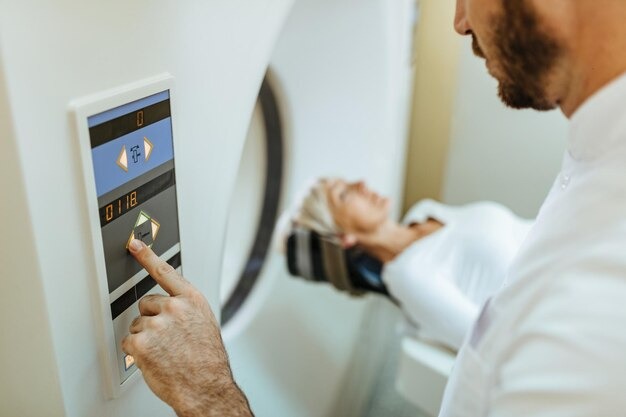In the dynamic arena of mental health, pursuing enhanced well-being and improved mental wellness is an ongoing and vital mission. Technology, an ever-evolving entity, has emerged as a pivotal catalyst in this quest, propelling innovation and fostering new pathways toward mental wellness. Transcranial Magnetic Stimulation (TMS) machines, a remarkable product of this innovation, hold immense promise in this landscape.
This involves using electromagnetic fields to stimulate specific brain regions, offering a non-invasive and potentially transformative approach to managing various mental health conditions. It holds great potential in alleviating symptoms associated with depression, anxiety, PTSD, and more. The remarkable aspect of TMS lies in its ability to modulate brain activity, promoting better mental health without the need for invasive procedures or extensive medication.
In this blog, we will delve into the profound potential of TMS machines in enhancing mental wellness. We’ll explore the diverse range of mental health conditions TMS can address, its non-invasive nature, and its promise for individuals seeking effective treatment options.

Understanding Transcranial Magnetic Stimulation
TMS machines involve magnetic fields to induce electrical currents within the brain. This stimulation targets specific brain areas, modulating neural pathways and influencing brain function. Unlike invasive procedures, TMS is non-intrusive, making it a more attractive option for patients and healthcare professionals.
These machines utilize powerful electromagnets that generate fluctuating magnetic fields, stimulating or inhibiting neuronal activity in the brain. Depending on the frequency, intensity, and duration of the magnetic pulses, TMS can affect brain function differently.
Unlocking Solutions: Ailments Addressed By Transcranial Magnetic Stimulation Machine
- Depression and Anxiety Disorders
Depression and anxiety are the most common mental health conditions affecting millions globally. Earlier traditional treatments like medication and psychotherapy may not be effective for everyone. Therefore, TMS devices offer a promising alternative for individuals who haven’t responded well to other therapies.
By modulating neural circuits associated with mood regulation, TMS can alleviate symptoms and improve the quality of life for those grappling with these mental health challenges.
- Chronic Pain Management
Chronic pain, whether neurological or musculoskeletal in origin, can severely diminish an individual’s daily life. These devices present an innovative approach to managing chronic pain by targeting the brain regions responsible for pain perception and processing.
By modulating these areas, TMS can relieve persistent pain and improve overall pain management strategies.
- Obsessive-Compulsive Disorder (OCD)
OCD is a condition characterized by intrusive, unwanted thoughts and repetitive behaviors. The devices have shown promise in alleviating symptoms of OCD by influencing the neural pathways associated with the disorder.
By utilizing TMS machines to stimulate or inhibit specific brain regions, patients may experience reduced compulsive behaviors and intrusive thoughts, ultimately enhancing their quality of life.
- Post-Traumatic Stress Disorder (PTSD)
PTSD is a complex condition that can profoundly impact an individual’s mental and emotional well-being. TMS devices offer a potential avenue for mitigating the symptoms of PTSD by modulating the brain circuits associated with fear responses and emotional regulation. This innovative approach may relieve individuals suffering from the long-lasting effects of traumatic experiences.
- Cognitive Disorders and Neurological Conditions
TMS holds promise in improving cognitive function and addressing neurological conditions such as Alzheimer’s disease, Parkinson’s disease, and stroke recovery.
By targeting specific brain regions associated with memory, motor function, and cognitive processing, TMS devices may enhance brain plasticity, potentially slowing down cognitive decline and aiding in rehabilitation after neurological injuries.
How TMS machines help in Maximizing Return on Investment (ROI)
- Efficient Scheduling and Utilization
Maximize using the TMS device by efficiently scheduling sessions throughout the day. Ensuring the machine is utilized to its total capacity allows for more treatments, ultimately enhancing the ROI.
- Diversifying Treatment Offerings
Consider offering various TMS treatment options to expand the patient base and increase revenue streams. Addressing a broader range of mental health conditions with TMS can attract more patients and boost the overall ROI.
- Collaborations and Partnerships
Collaborate with other healthcare providers or institutions to share the cost burden and maximize utilization. Joint ventures or partnerships can facilitate access to TMS for a larger patient population, making the investment more economically viable.
Conclusion
The journey toward optimal mental wellness is evolving, and Transcranial Magnetic Stimulation (TMS) machines have carved a significant niche within this expedition. By unlocking the potential of TMS devices , individuals and mental health professionals can embrace a non-invasive, effective, and promising approach to address various mental health conditions.
Moreover, delving into the TMS machine cost is essential for practical implementation and accessibility. At the intersection of understanding the potential and weighing the costs, we can make informed decisions to maximize mental wellness.
Almagia provides Diamag-03, which helps stabilize vision in patients with chronic iridocyclitis. It also helps in relieving pain in patients with migraine. Visit our official website to get amazing deals on this device.
